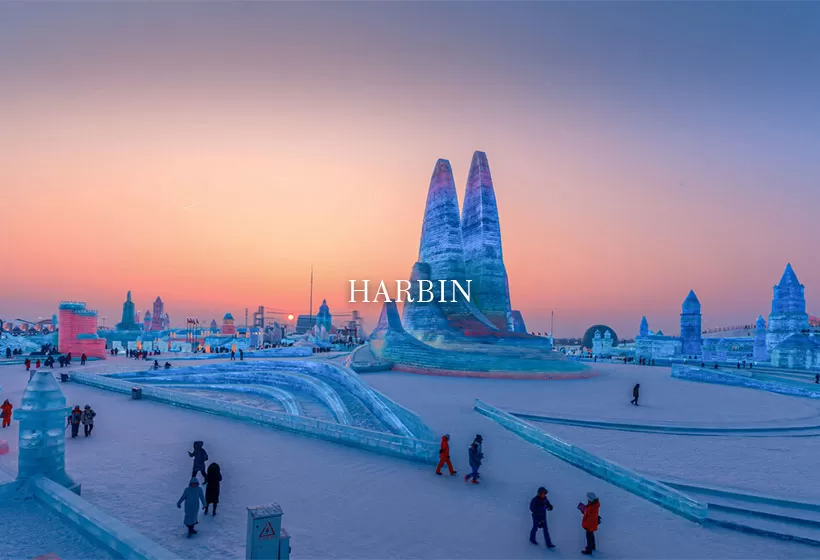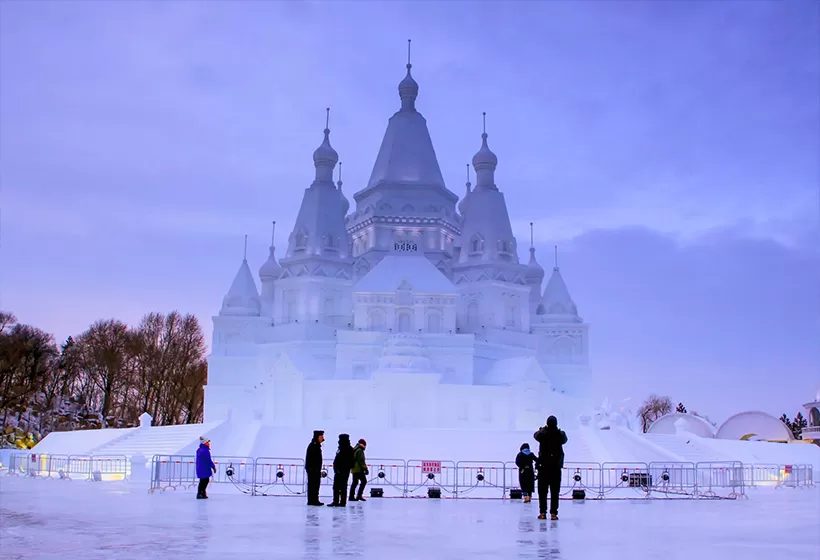Short Introduction to Harbin Local Culture: History, Nation, Diet, Religion, etc.
Harbin encapsulates the rich cultural heritage of northern ethnic minorities while blending influences from Central Plains culture, Jin Yuan culture, Peking Banner culture, Russian expatriate culture, and Jewish culture. This makes it a renowned historical and cultural city in China.
Brief History
 History of Harbin
History of HarbinAs early as 22,000 years ago, there were human activities in the Harbin area. Around 3,000 years ago, it entered the Bronze Age, becoming part of the distribution area of the Baijinbao culture, the earliest ancient civilization in Heilongjiang.
In 691 AD, the Tang Dynasty sent troops to subdue the Mohe people, who became subjects of the Tang. By 698 AD, the Mohe established the Bohai State, with Harbin as part of its territory.
In 1115, Wanyan Aguda founded the Jin Dynasty and established Shangjing (present-day Acheng in Harbin) as its capital.
In 1903, the completion of the Chinese Eastern Railway marked the beginning of modern Harbin as an international trading hub, attracting over 160,000 foreign residents from 33 countries and establishing consulates from 19 nations, making it a key economic center in Northeast China.
On February 5th, 1932, Japanese invading forces occupied Harbin. The city was liberated from Japanese rule on August 15th, 1945, following Japan's surrender.
On April 28th, 1946, Harbin established a people's government, becoming one of the earliest large cities to be liberated in China.
On July 18th, 1953, Harbin was designated a directly governed municipality. Subsequently, on August 1st, 1954, Songjiang Province merged with Heilongjiang Province, and Harbin was designated as the provincial capital of Heilongjiang.
Ethnic Culture
Harbin is a large, multi-ethnic city with a significant population of ethnic minorities, known for its diversity and strong mobility. The city is home to 45 ethnic groups, with the main ones being the Manchu, Korean, Hui, Russian in China, and Mongolian, primarily distributed in areas such as Nangang, Shuangcheng, Wuchang, Shangzhi, and Yilan.
The Manchu people are one of the largest ethnic groups in Harbin. They established the Jin and Qing dynasties, and their ancestors are credited with naming the city. The Manchu are known for their hard work, bravery, and intelligence, as well as their ability to absorb and innovate external cultures. Their customs and culture are similar to those of the Han Chinese, yet they retain distinct Manchu characteristics.
The Korean ethnic group is prevalent in Northeast China due to the geographic proximity and frequent interactions between the Korean Peninsula and the region. In Harbin, visitors can explore unique Korean folk villages, where colorful traditional attire and a strong emphasis on respecting elders and teachers are evident.
The Russian in China ethnic group descends from Russian immigrants, and after over a century of integration, they have developed distinct cultural characteristics that differ from those of Russians in Russia. Of course they celebrate some traditional Russian holidays, and their residential architecture showcases a unique Russian style, preserving specific beliefs and customs.
Special Festivals
 Ice and Snow Festival
Ice and Snow Festival- Harbin International Ice and Snow Festival
Harbin International Ice and Snow Festival is China's first international festival centered on ice and snow activities, and it ranks among the world's four major ice and snow festivals. It begins on January 5 and lasts for about a month, featuring over a hundred activities including ice and snow displays, professional sports events, entertainment experiences, and cultural arts.
- Harbin Summer Music Concert of China
Harbin Summer Music Concert of China takes place annually from August 6 to 15 and is one of the country's three major music festivals. Harbin's unique cultural tradition, enriched by foreign immigrants, has fostered a love for music. The festival combines classical and popular music as well as indoor and outdoor events, making it a significant cultural showcase for the city.
 Harbin International Beer Festival
Harbin International Beer Festival- Harbin International Beer Festival
Harbin is the birthplace of China's first beer, and the Harbin International Beer Festival, initiated in 2002, is one of the nation's top three beer festivals. The event blends beer with art, music, sports, and culture, featuring a variety of cultural activities alongside food markets, amusement projects, and musical performances.
- Harbin Ice Harvest Festival
The tradition of ice harvesting in China dates back over 3,800 years to the Xia, Shang, and Zhou dynasties. Each year during the "Heavy Snow" solar term, Harbin celebrates its annual ice harvesting festival, where harvested ice blocks are sent to the Harbin Ice and Snow World to create stunning ice sculptures.
Religious Culture
Harbin boasts a remarkable diversity of religious beliefs, which is quite rare in both domestic and international cities. The city is home to an impressive array of churches and temples—over 128 by the 1930s—representing various faiths, including Orthodox Christianity, Protestantism, Catholicism, Judaism, Islam, Buddhism, Taoism, and Shinto.
Most temples and Daoist shrines follow traditional Chinese architectural styles, while mosques bear a striking resemblance to those found in Islamic countries. The Christian churches, however, showcase a variety of architectural styles, including Gothic, Byzantine, Baroque, and Moorish influences. Given that the majority of Russians practice Orthodox Christianity, Harbin has many Orthodox churches, contributing to its rich cultural landscape.
The city's immigrants from Shandong and Hebei predominantly follow Buddhism, with fewer practicing Taoism. The Hui people adhere to Islam, while many residents from Europe and America are Christians, primarily divided among Protestantism, Catholicism, and Orthodoxy.
Custom Culture
- Wild Outing
Influenced by northern nomadic cultures, Harbin developed a tradition of "wild outings" as early as the 1890s. After liberation, this practice became increasingly popular, with many organizations arranging outdoor activities for employees in spring, summer, and autumn, as well as family outings.
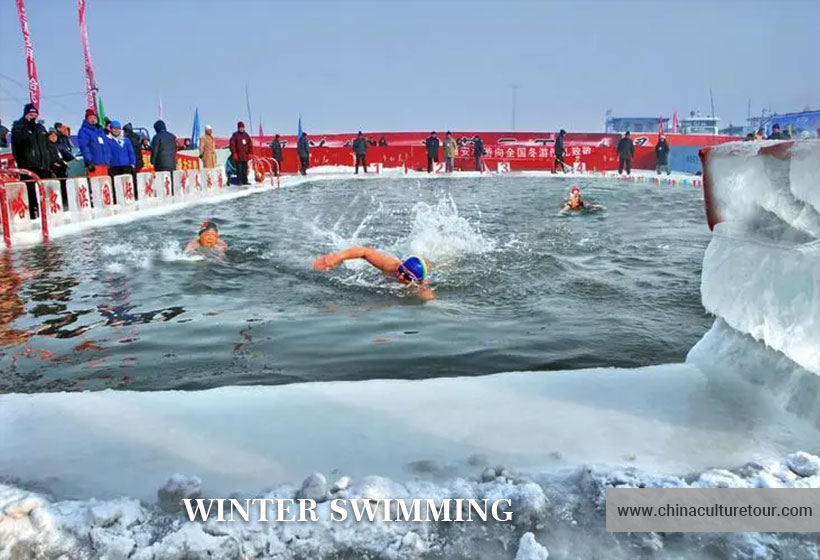 Winter swimming
Winter swimming- Winter swimming
Winter swimming is a culturally distinctive sport in Harbin. During winter, swimmers clear a path through the ice on the Songhua River to create swimming pools on the ice, typically swimming around 5 to 6 AM before sunrise.
- Drink Beer
Harbin has been producing beer since the early 20th century, with the Harbin Brewery founded in 1900, boasting over a century of history. The annual beer consumption exceeds 300,000 tons, making Harbin the city with the highest per capita beer consumption in China.
 Ice Lantern
Ice Lantern- Ice Lantern
The tradition of ice lanterns in Harbin began in the early 1960s, combining garden art with architectural and sculptural techniques, using electric light as a source to create various ice sculptures and scenes.
Diet Style
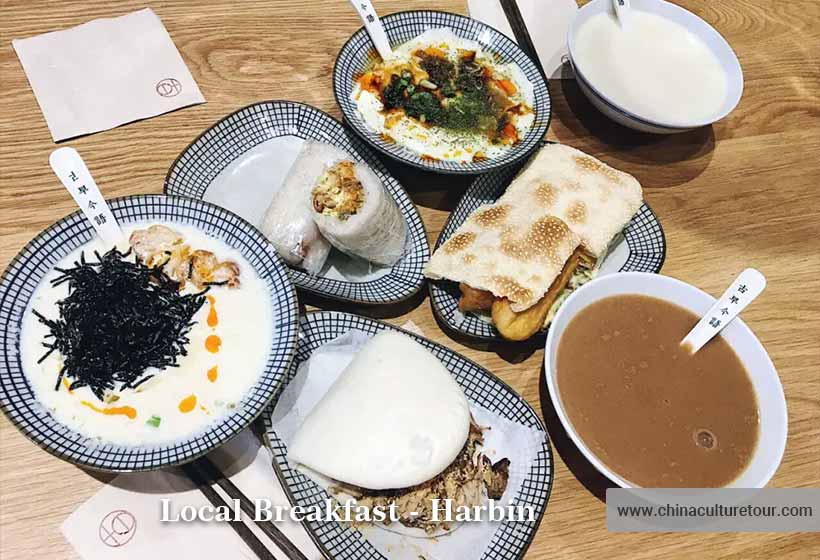 Harbin Breakfast
Harbin BreakfastHarbin's population largely descends from Shandong immigrants, who brought with them Qilu culture, including Shandong cuisine. This blends with the indigenous Manchu culinary traditions and some Russian influences, gradually forming a unique Harbin food culture.
The region boasts excellent cooking ingredients, including mountain delicacies from the Greater and Lesser Xing'an Mountains, river fish from the Songhua River, and salmon from the Heilongjiang River. Harbin cuisine is renowned for its preparation of game and river fish, featuring strong flavors and generous portions, often salty and savory, with a focus on primary ingredients. Influenced by Shandong and Beijing cuisines, it excels in methods like braising and roasting while maintaining traditional techniques such as stewing and boiling.
Despite the cold weather, many locals enjoy cold foods and drinks, including ice cream and beer, which Harbin was among the first cities in China to embrace, largely due to the influence of Russian immigrants who brought their favorites into the city, gradually integrating them into the local culture.
Cultural Heritage
 Harbin Confucius Temple
Harbin Confucius TempleHarbin, the Ice City of Northeast China, once radiated a unique cultural brilliance. Here, Eastern and Western cultures converge, leaving behind a distinctive historical imprint. From century-old European-style villas to breathtaking Russian churches and authentic local delicacies like Harbin sausage, these elements testify to the city’s journey of multicultural integration.
St. Sophia Cathedral is the best-preserved example of Byzantine architecture in China, showcasing a magnificent and elegant structure filled with captivating colors. Zhongyang Street is Harbin's bustling pedestrian street, featuring 71 buildings in various architectural styles, including Renaissance and Baroque. The Harbin Confucius Temple is the last well-preserved Confucian temple in the country, as well as the largest and most complete ancient architectural complex in Heilongjiang Province. Together with Harbin's iconic Harbin sausage, simple yet elegant square paper cuttings, and the free and easy Shuangcheng shadow puppetry, they create a vibrant cultural heritage unique to Harbin.
Customize Your Unique Harbin Ice and Snow World Tour

If you are interested in one of the Harbin itineraries mentioned above, please contact us, and we will be happy to customize it and provide a quote tailored to your preferences.
Alternatively, if you would like to customize your Harbin Tour, please visit our Harbin Tour Customized Center. We assure you that you will receive a reply within 24 working hours.
Informative Articles for Your Harbin Trip
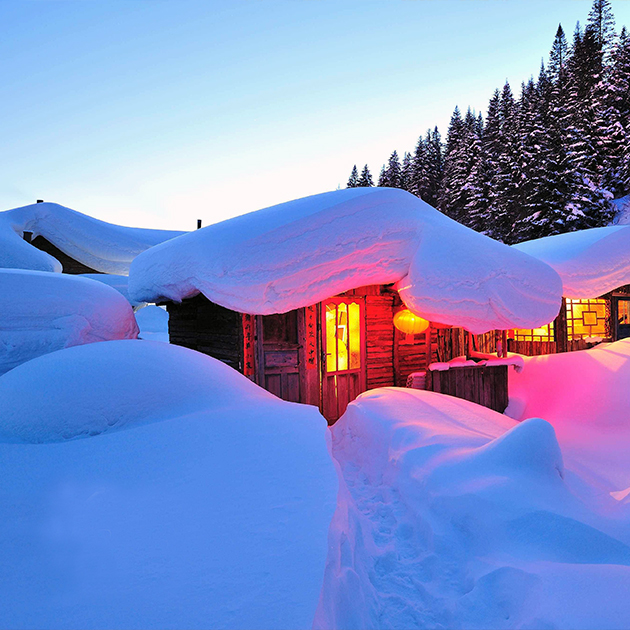 China Snow Town
China Snow Town- Travel Guide: attractions, weather, hotels, food, etc.
- Top destinations: best places to visit in Harbin
- Travel itineraries: itineraries for your reference
- Local culture: brief history, folk culture, festivals, etc.
- Weather: the best time and seasons to visit Harbin
- Top attractions: sightseeings to watch in Harbin
- Cultural immersions: activities to spotlight your trip
- Unique perspective: best interesting things to do
- Local food: what to eat while traveling in Harbin
- Luxury hotels: best accommodation to stay in Harbin
- Harbin Tours: customized Harbin tours for your reference
GREAT FAMILY CHINA TOUR
JULY 2024 We wanted to thank Grace at China Culture tour for organizing a great tour of China. We enjoyed our Beijing - Xian-Chengdu -Guilin -Yangshuo - Shanghai trip. Our local guides Bruce in Beijing, Susan in Xian, Jane in Chengdu, Mike in Guilin and Mary in Shanghai took care of us…read more details »
Teng Han L from SINGAPORE
Ready to Create a Unique Dream Travel?
